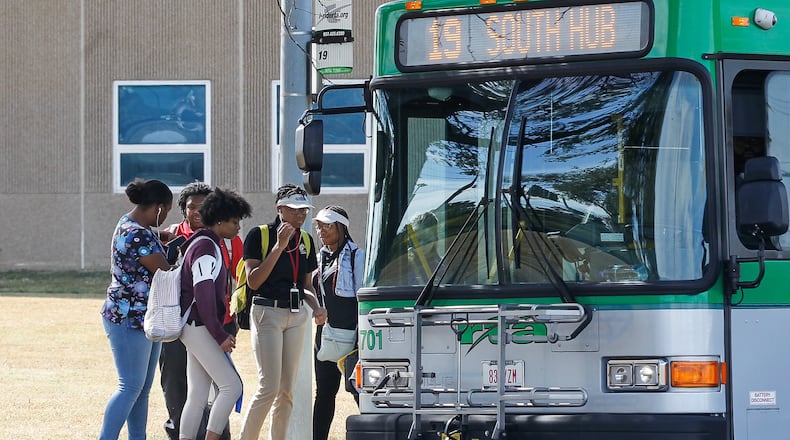That RTA contract had just started in fall 2019, with DPS paying RTA about $800,000 to upgrade 32 buses, plus about $3 million per year for the actual busing service.
But DPS Superintendent Elizabeth Lolli told the school board this week that the RTA contract has been terminated. She said there were COVID-closure reasons, as well as return-on-investment reasons.
“Our hope that by providing bus passes we could increase our high school attendance didn’t really pan out,” Lolli told the board. “So at this point in time, there is no plan to reinstitute high school busing.”
The data Lolli gave the school board showed high school attendance did rise in 2019-20, but only enough to make up for a downward blip the year before.
Lolli said high school attendance was around 89% three straight years from 2015-18 when DPS did not offer high school busing. Then it dipped to 86% in 2018-19, in part triggering the decision to partner with RTA. Lolli said high school attendance was back to 89% in 2019-20 before the COVID closures, but “didn’t go any higher.”
The Dayton school district is doing all classes online for at least the first quarter. Lolli said when students return to in-person school, for the rest of 2020-21, the district will transport all kindergarten through eighth-grade students on district yellow buses, but will not offer high school transportation. That will apply to both DPS students as well as charter and private school students.
DPS has struggled with busing for years, both in hiring enough drivers and with on-time performance. Under Ohio law, public schools are also responsible for transporting K-8 students who live within district boundaries but attend charter or private schools, and in Dayton, that’s a big issue.
According to February state data, DPS had about 12,600 students attending its own 26 schools, another 6,700 students at charter schools (27 physical schools plus some online), and 3,000 students at more than 30 private schools.
“We still have to come up with a long-term solution because we can’t continue to bus the number of charter and non-public students we have,” Lolli said.
Lolli said DPS is currently “having conversations with companies” about busing, but said she couldn’t go into detail about those discussions. Some schools contract with outside companies like First Student to handle some busing needs.
School board President Mohamed Al-Hamdani said DPS chose the RTA model not just for attendance, but to alleviate some of the pressures on families — cost pressures of buying bus passes for high schoolers, or time pressures of trying to get kids to school and still get to work on time.
He urged Lolli to look into the possibility of providing paid high school bus passes for families who need them. Lolli said the district could consider that, but any option they offered to DPS families, legally would have to be offered to charter and private-school families, so there would have to be a “vetting system.”
In July, when DPS thought its students would be back in school this fall, the district had said all charter and private school students would ride the special RTA routes this year. But details of that plan were never formalized. Those charter and private school students who are doing in-person school have been riding DPS yellow buses in the past month.
Lolli said 90 total DPS bus drivers are currently employed, 64 of them driving those non-DPS routes and doing school lunch delivery to DPS families. Another 56 drivers were furloughed for the online school period.
RTA Executive Director Mark Donaghy said either RTA or DPS was able to terminate the five-year busing contract with 120 days notice, which DPS did. He said many of the 32 surplus buses RTA used will be sold, and staffing reductions will be handled through attrition.
“Given the situation this year, we’ve been working with (DPS) as we could,” Donaghy said. “In the spring we obviously stopped running service and we didn’t pursue any additional payment from them (after that).”
About the Author

